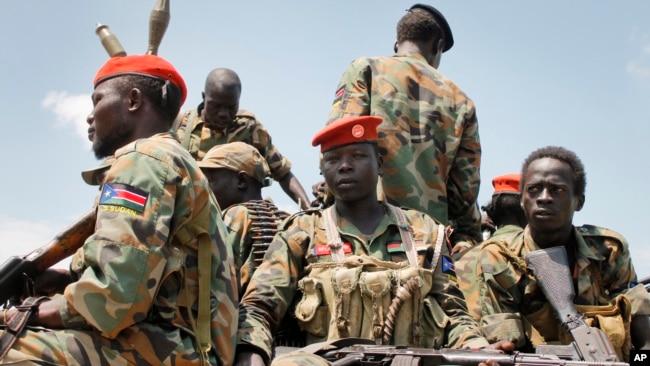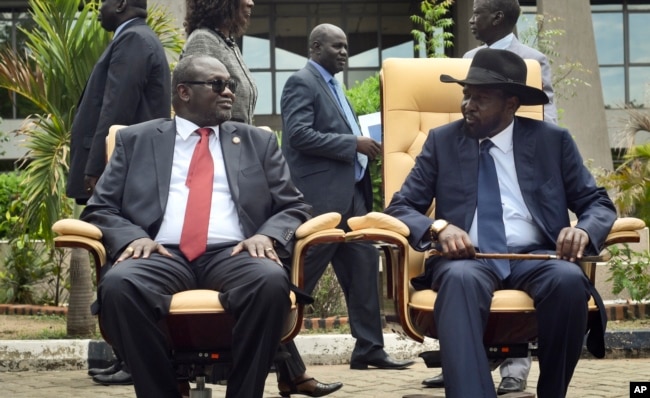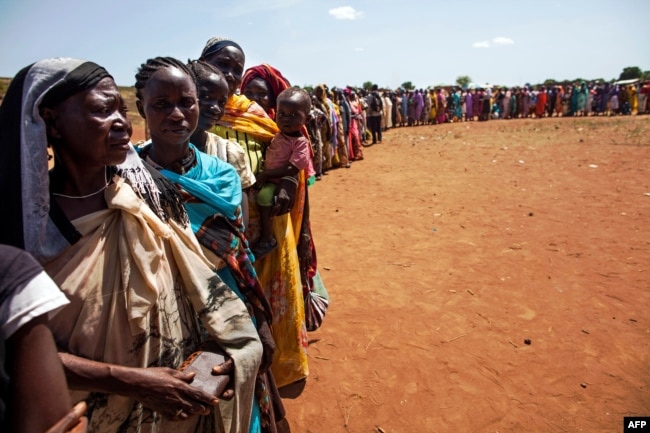Date: Fri, 10 Feb 2017 18:10:49 +0100
UN Says South Sudan National Dialogue Could Be Undermined by Violence

FILE - South Sudanese government soldiers are shown in October 2016.
While the South Sudan government prepares for a national dialogue early next month, one high-ranking United Nations official said the talks could be undermined by the ongoing violence in the country.
Adama Dieng, the U.N. Special Adviser to the Secretary-General on the Prevention of Genocide, told VOA's South Sudan in Focus that the Kiir administration should concentrate on creating meaningful dialogue that includes the opposition, as well as a path to justice.
"I should remind President Kiir and his government so to acknowledge that peace is not made among friends, it is made among enemies," said Dieng, who added that South Sudanese should begin to look at themselves as brothers and sisters.
Dieng added that a national dialogue, which Kiir said would begin early next month, should include "credible political alternatives" for the opposition leaders, not unlike former First Vice President Riek Machar, who Dieng said are currently excluded from the dialogue.

FILE - South Sudan's then-First Vice President Riek Machar, left, looks across at President Salva Kiir, right, as the two sit to be photographed, April 29, 2016.
Machar has been living in exile in South Africa since September. The rebel leader fled from the capital Juba across the border to Sudan in July, when a surge in fighting occurred between forces loyal to Kiir and those who supported Machar.
Skepticism remains
Kiir told citizens in the troubled town of Yei this week that the national dialogue would be an open forum where issues affecting all South Sudanese would be addressed. He had traveled to Yei in the newly-created Yei River State to try to calm the fears of residents traumatized by weeks of deadly fighting between unidentified armed groups and government forces.
Princeton Lyman, the former U.S. Special Envoy to Sudan and South Sudan, told VOA that he is skeptical that a meaningful dialogue can take place when "there is no freedom of movement or freedom of expression."
"It would be hard to put together under these conditions an effective national dialogue," Lyman said. "Nevertheless, they have called upon two credible civil society groups to work with them, and if those groups can lay out the conditions necessary for a national dialogue, maybe there is some hope there."
Tensions continue to rise in parts of South Sudan, including in Central Equatoria State's Kajo Keji, where the United Nations reported in recent weeks that civilians are fleeing in fear of more violence. The U.N. also said earlier this week that its peacekeepers were blocked from accessing the area by armed men in uniforms.

FILE - Internally displaced people, who recently arrived in Wau, South Sudan due to armed clashes in surrounding villages, wait to be registered by the International Organization for Migration and the World Food Program, May 11, 2016.
More attacks deemed likely
Dieng said that the risk of more atrocities being committed in South Sudan remains high.
"We see the SPLA reinforcing its position throughout the country and launching military operations on the rebels when attacks occur, including reprisal and punishment against civilian communities believed to be their supporters," said Dieng, using the acronym for the military, known as the Sudan People's Liberation Army.
After the U.N. Security Council failed to pass a resolution last year that would have enacted an arms embargo on South Sudan and increased sanctions on certain individuals, Dieng said arms continue to flow into the country, further undermining the peace process.
"That is why I have been calling for a genuine dialogue to make sure that the political process really reaches a situation where everybody will be around the table," Dieng said.
The U.N. official said it is also of the utmost importance that the dialogue includes representatives of the South Sudanese diaspora.
Kiir said at a public rally in Yei this week that holding a national dialogue is the only way to end the ongoing conflict in South Sudan.